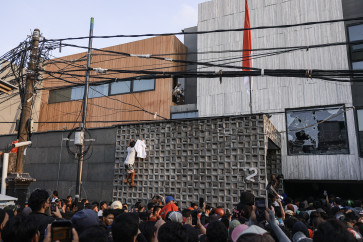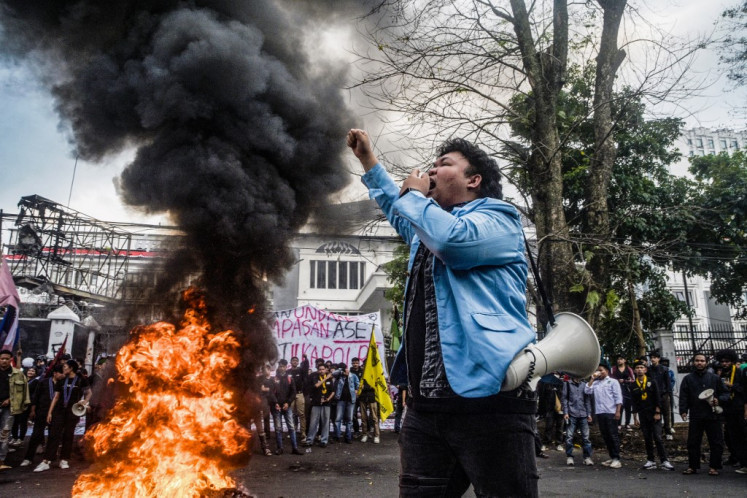Popular Reads
Top Results
Can't find what you're looking for?
View all search resultsPopular Reads
Top Results
Can't find what you're looking for?
View all search resultsCampus focus: Extracurricular activities as experiential learning
Rapid changes in information and technology have undoubtedly brought about significant effects on students
Change text size
Gift Premium Articles
to Anyone
Rapid changes in information and technology have undoubtedly brought about significant effects on students. Once passive recipients of knowledge, they are now capable of producing their own versions of knowledge they bring to the classroom, as a result of their constant engagement with the fast-paced changing vicinity.
The changing terrain in education due to the rapid flow of communication and information should engender ethical considerations for teaching as well as learning. Teaching is perceived as a process of meaning negotiation, rather than simply knowledge transfer. It is dialogic, not monologic. It values students’ cultural and social backgrounds, and their beliefs of and attitudes toward learning.
Equipped with the influx of information they have obtained outside of schools, students show a remarkable prowess that may disrupt the predetermined and prescribed approaches to formal classroom learning, much to teachers’ dismay.
By the same tokens, the varieties of techniques and teaching materials nicely stipulated in the curriculum may be at odds with students’ expectations, which may indicate a yawning gap between what schools assume their students wish to learn and with what students expect schools to teach them.
Admittedly, formal education has too often overlooked the importance of experiences and practice students have in the process of curricula design, and how these external factors contribute to their development of life skills crucial for their future careers and employability.
In fact, many facets of learning cannot simply be predicted and systematically arranged in a form of curricula or other rigid prescriptions, as students may exhibit considerably distinct learning styles and strategies, and bring unpredictable external factors that might render the curricula irrelevant to their varied needs.
As a consequence, there is at present an emphasis on giving a more equal weight to extracurricular activities, which are believed to be able to tap into a special and unique context in which natural learning occurs. Consider, for example, competition clubs, student exchange programs, debate groups, speech contests and sports, amongst others. These activities provide enhanced opportunities for students to learn by doing, by practicing and by experiencing, with innovation as the eventual goal.

Experiential learning
This is because extracurricular activities serve as a foundation to experiential learning, a conducive, free-surveillance environment where they can take their own risks and experiment with and explore everything they consider worthy for acquiring life skills, which are almost absent in formal learning contexts.
It is through this informal learning that students can feel freedom in their endeavors to make sense of their activities and then experiment with them without pressure. In this way, they can develop their own styles of learning and of sense-making through first-hand experience and practice.
Empirical studies have shown that extracurricular activities have numerous merits for students and that they raise self-confidence and provide the required skills to engage in building one’s entrepreneurship.
Furthermore, open learning space is not limited to activities prescribed in rigid learning formula, which may stifle students’ creativity and inquisitiveness. It instead allows students to continuously generate fresh ideas and knowledge through their practical engagements with the environment in everyday practice. It also provides them spaces to reflect, ponder over and assess their learning growth.
The importance of experiential learning and learning by practicing should also be intended to bridge or even minimize the gaps that exist in formulized learning in the classroom. Because many activities are predetermined in formal learning curricula, not all of them are suitable to students’ learning styles and values. In this respects, students’ everyday practice and experience can serve as a real contextual test against which the usefulness of the previously assumed activities can be confirmed or disconfirmed.
Despite the fact that both informal extracurricular activities and formal learning environments have their own unique learning contexts that may not match each other, it does not follow that each learning situation is mutually exclusive. Rather, both can be mutually reinforcing and create an integrated link, which, in the end, may help connect the ideal and the real.
The relation then should not always be the theory-to-practice one, but the practice-to-theory as well. Theoretical guidelines can assist learners in practicing their previously acquired skills, enlightening them how to best apply these skills in real life. Likewise, as curricular activities are practice and action-oriented, it can beneficially inform theoretical insights about those missing or neglected parts that need complementing or even correcting.
Armed with both perspectives, educational institutions need to provide spaces for students to explore themselves in out-class activities as well as continuously revise and adapt their curricula to the constantly changing environment. (Setiono Sugiharto)
___________________________________
The writer teaches at the graduate school of applied English linguistics, Atma Jaya Catholic University. He can be contacted through setiono.sugiharto@gmail.com.
Photos JP/R. Berto Wedhatama










